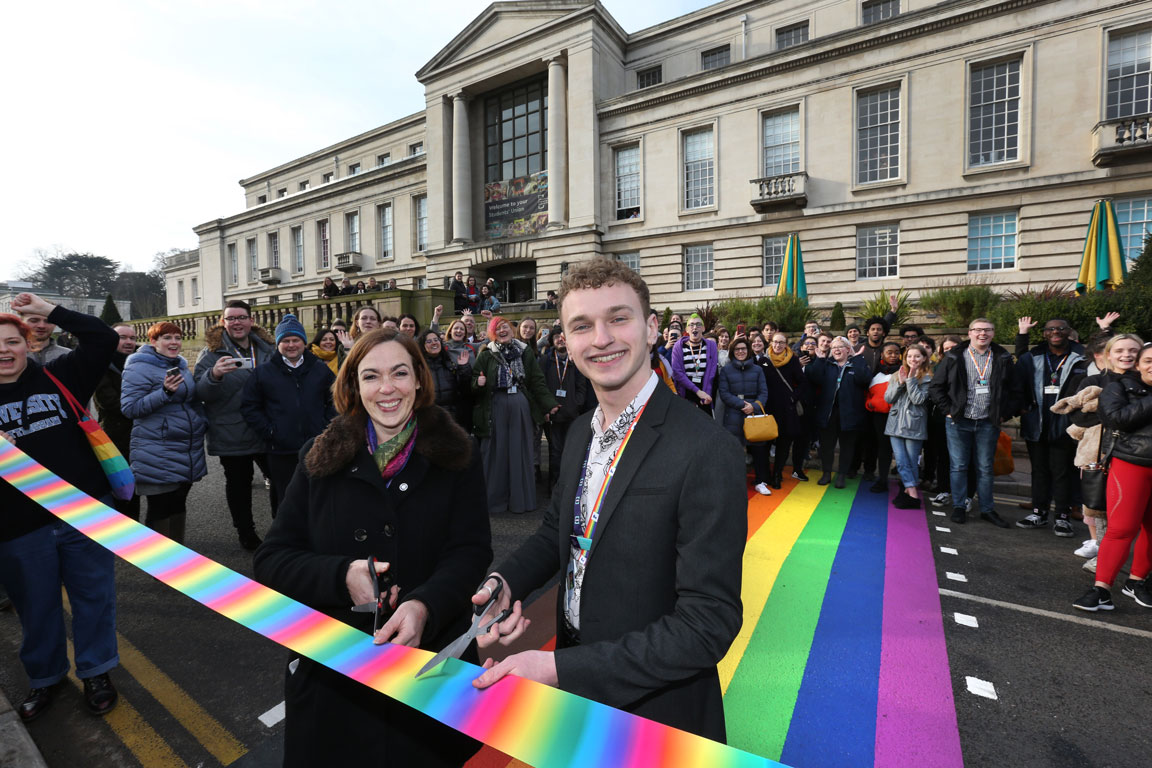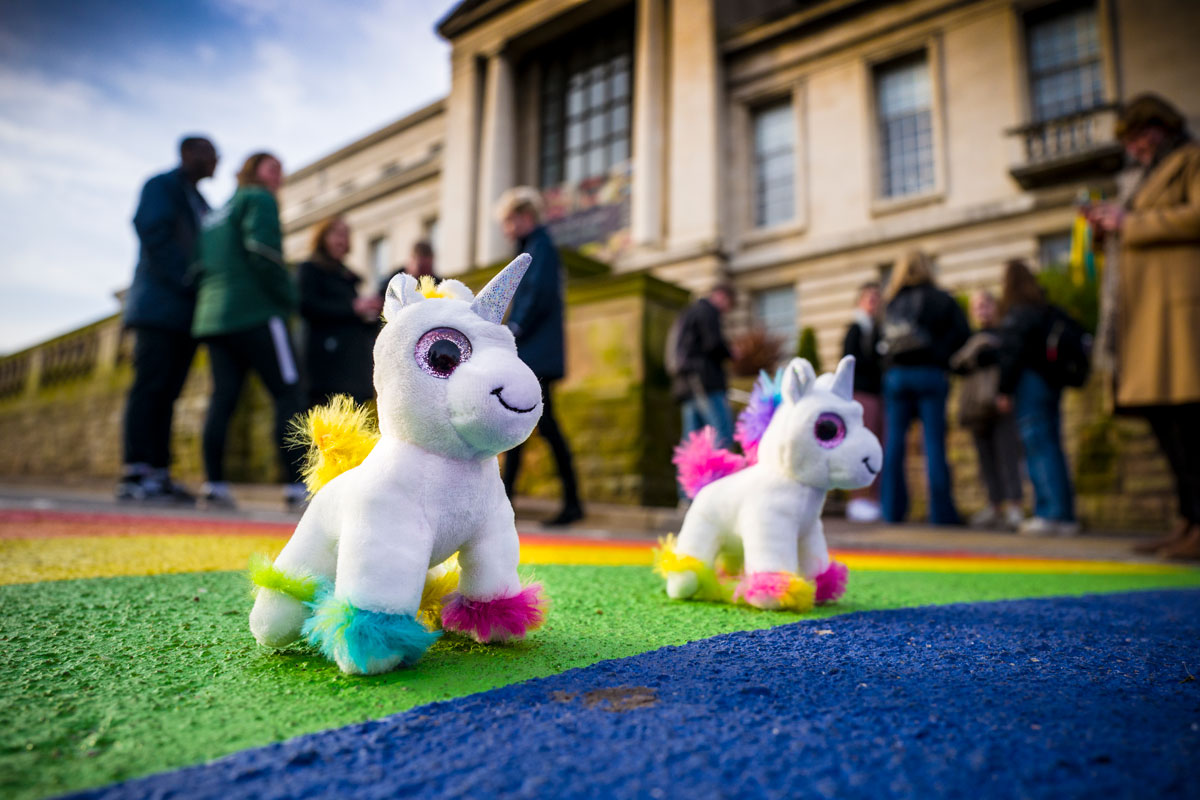Wednesday, 05 February 2020
University of Nottingham marks LGBT History Month with launch of rainbow crossings on its UK campuses
It’s a familiar fixture of our national road network and was most famously featured on the iconic cover of the Beatles’ Abbey Road album. But now the University of Nottingham is set to give the quintessentially British monochromatic zebra crossing a colourful makeover in support of its LGBT+ community.
During February - which is LGBT History Month - the University will be unveiling rainbow ‘zebra’ crossings on its three UK campuses to foster a welcoming atmosphere, demonstrate its strong commitment to inclusivity and celebrate the diversity of all its staff and students.
Taking inspiration from the recent installation of a rainbow road by Nottingham City Council on Broad Street in the city, and acting in response to suggestions from its own student community, the university will be installing rainbow crossings outside Portland Building on University Park, the Yang Fujia Building on Jubilee Campus and the Gateway Building on Sutton Bonington campus.
 Professor Sarah Sharples and Sam Hawkins launch the new rainbow crossing.
Professor Sarah Sharples and Sam Hawkins launch the new rainbow crossing.
The crossings will feature the same colours used in the Pride flag, with the additional inclusion of black and brown stripes to recognise the intersectional relationship between the LGBT+ and black and multi-ethnic (BME) communities.
The first of the crossings on University Park was unveiled on Friday 7 February by Professor Sarah Sharples, Pro-Vice-Chancellor for Equality, Diversity and Inclusion, and Sam Hawkins, the Students’ Union LGBT+ Officer.
Professor Sarah Sharples said the rainbow crossings are a powerful symbol of the university’s commitment to inclusion and reinforced its partnership with Nottingham City Council.
She added: “The suggestion for the crossings came directly from our Students’ Union and we were delighted to be able to work together with them to make these crossings a reality.
Our Nottingham campuses are a key part of the experience of being a University of Nottingham student or staff member, and I know that for me, when I see them, the crossings will remind me of the University’s support for our LGBTQ+ students and staff, and our commitment towards equality, diversity and inclusion which will make the university better for us all.
The crossings are designed to demonstrate that the university is taking steps to make those from minority backgrounds more visible on its campuses and challenge the barriers that those students may face. The initiative also aims to raise the profile of its staff and student LGBT+ networks.
Sam Hawkins said: “By installing rainbow crossings on three of our campuses, this sends out a very clear message to our students, both current and prospective, that the University of Nottingham is an institution that values equity, and that bigotry of any kind is not tolerated. The rainbow crossings challenge some of the systematic barriers which prevent people from bringing their best selves to their degree. It says “we see your struggle, and we are here to support you”. Furthermore, the addition of the brown and black stripes aims to celebrate the countless Black LGBT+ trailblazers who started the gay rights movement whilst also being a symbol of support for racially marginalised members of the LGBT+ community.
“Across the world, rainbow crossings have been installed in cities such as London, Sydney and Paris. Therefore, I am incredibly proud to say that we now have our very own at the University of Nottingham.”
The University of Nottingham has recently introduced a number of measures to promote and support diversity across its staff and student community including: recruitment diversity guidelines and piloting use of anonymised applications; training for academics to address unconscious bias in the classroom; inclusive teaching practices; reverse-mentoring schemes; and work to decolonise the curriculum.
It has appointed a Pro Vice-Chancellor for Equality Diversity & Inclusion to ensure dedicated representation for staff and students of all protected characteristics and recently published a new EDI Strategic Delivery Plan. The new University Strategy highlights the important of inclusivity in all that we do.
More broadly, the University has upgraded its systems and support to report and investigate harassment, developed specific campaigns to stress the inclusive values of the University of Nottingham as a community, and increased numbers of specialist Dignity Advisers to advise and support staff.

Notes to editors:
About the University of Nottingham
Ranked 97 in the world and 17th in the UK by the QS World University Rankings, the University of Nottingham is a founding member of Russell Group of research-intensive universities. Studying at the University of Nottingham is a life-changing experience, and we pride ourselves on unlocking the potential of our students. We have a pioneering spirit, expressed in the vision of our founder Sir Jesse Boot, which has seen us lead the way in establishing campuses in China and Malaysia - part of a globally connected network of education, research and industrial engagement.
Nottingham was crowned Sports University of the Year by The Times and Sunday Times Good University Guide 2024 – the third time it has been given the honour since 2018 – and by the Daily Mail University Guide 2024.
The university is among the best universities in the UK for the strength of our research, positioned seventh for research power in the UK according to REF 2021. The birthplace of discoveries such as MRI and ibuprofen, our innovations transform lives and tackle global problems such as sustainable food supplies, ending modern slavery, developing greener transport, and reducing reliance on fossil fuels.
The university is a major employer and industry partner - locally and globally - and our graduates are the third most targeted by the UK's top employers, according to The Graduate Market in 2024 report by High Fliers Research. Alongside Nottingham Trent University, we lead the Universities for Nottingham initiative, a pioneering collaboration between the city’s two world-class institutions to improve levels of prosperity, opportunity, sustainability, health and wellbeing for residents in the city and region we are proud to call home. More news…